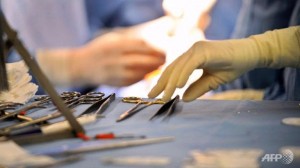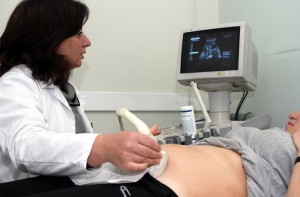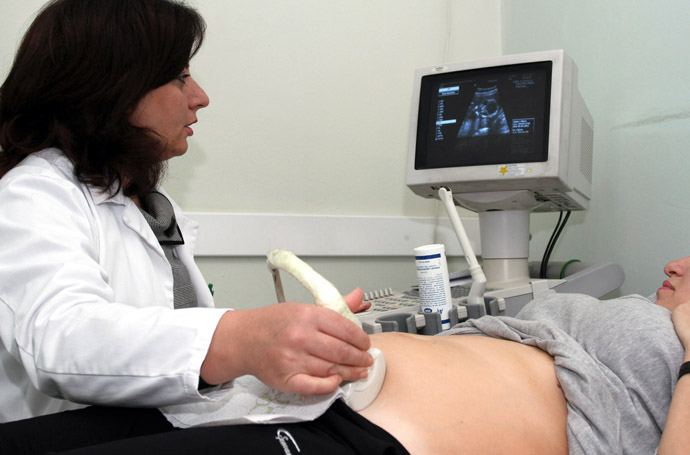
(Photo by: Ethar Chalaby)
Although legal, religious and social regulations bar women in Egypt from terminating their unwanted pregnancies, many women seek to undergo abortion across the country. Whether conducted for medical or other reasons, abortion remains a controversial and hotly-debated subject in Egyptian society. In gynaecology, specialists are split between an array of perspectives. Some believe abortion is a form of murder, others think it lies within the basic rights of women to have full control over their bodies. The question of whether or not abortion is morally wrong persists in the hearts and minds of many women when thinking about terminating a pregnancy.
Scientifically, abortion is conducted through medical or surgical procedures. Medical abortion, when the foetus is completely dislodged from the uterus, is carried out using certain drugs. Dr. Hussein Gohar, Head of Gohar Women’s Health Clinic, explains there are two drugs used in abortion: Mifepristone and Misoprostol, or what is known in pharmacies as Misotac. The latter medication should be taken 48 hours after the first. “When taken together within this time frame, the success rate of abortion exceeds 90%,” he says. Mifepristone inhibits the hormone progesterone, which is responsible for maintaining pregnancy, whereas Misoprostol triggers strong uterine contractions that dislodge the foetus from the uterine walls. Some women find it easier to end their pregnancies by using the medical procedure as a first step to secret abortion. Mifepristone is not available in Egypt. Therefore, women can only take Misotac.
Solutions limited: Clandestine abortions
Mona, who was engaged for more than three years, discovered she was pregnant a few months before her wedding. Feeling a desperate need to end the undesired pregnancy, she sought to purchase Misotac in many pharmacies. “I kept searching for it in almost every pharmacy in Cairo. They told me it is not widely available,” she says.
Abortion pills like Misotac used to be sold over the counter in pharmacies across Egypt, but for the past year, requests for Misotac are met with the response that it is “unavailable”. Misotac was not created as a medication for abortion, but was developed to treat stomach ulcers. According to its label, one of the medication’s side effects relates to the female reproductive system in the form of excessive bleeding and agonising uterine pain. It can therefore be used to abort embryos. Wael Ahmed, a pharmacist, says both Mifepristone and Misoprostol are actually available in pharmacies, but are not sold to customers. “It is a medication that leads to uterine contractions, and thus abortions. How would we know if the woman coming in to ask for it is married and wants to abort for medical reasons? We cannot sell it without a prescription,” he explains. Noha Al-Sayed, another pharmacist, says prostitutes were known to use the medicine so it was banned without a prescription on the instructions of the Ministry of Health. “It is available in all hospitals, of course,” she adds. Abortion is socially unacceptable in Egypt. It usually carries a negative connotation about women who request to undergo the procedure. Females who conduct abortions after engaging in premarital sex are considered sinners and are said to bring disgrace to their families.
After rushing into more than 30 pharmacies, Mona says she was not able to find Misotac in a single pharmacy in Cairo. “I had to call a doctor that I trust and he asked me for a large amount of money. He eventually brought it to me from a pharmacy in the governorate of Fayoum,” she says. The medication is definitely available in hospitals and has to be given under medical supervision. A gynaecologist who conducts abortions and requested to remain anonymous says he knows of doctors who will perform secret abortions for women who agree to perform sexual favours in return. “This is commonly known in the field. Some gynaecologists blackmail their patients because they know they are desperate for help,” he says.
Explaining the efficiency of some abortion medications, Gohar says Misotac, if taken alone without Mifepristone, could lead to a 60% success rate. If the medication is to be effective, it should be taken before the seventh week of pregnancy. But Mona was almost eight weeks pregnant when she discovered her pregnancy. “I was living in a nightmare. I only thought my period was late. My fiancée couldn’t help me to find the medicine and I had to get rid of this pregnancy at any cost,” she says. After finally obtaining the drug, Mona took four tablets in two days. “I had excessive bleeding and was taken to hospital. Fortunately, my parents weren’t around when I was transferred to hospital. I had to undergo a surgical abortion,” she says.
Gohar, who is also a fellow of the Royal College of Obstetricians and Gynaecologists in London, explains that the procedure takes around 15 minutes, during which the gynaecologist uses suction to remove the foetus from the uterus. Commonly known as dilation and curettage, the surgery can be performed under general or partial anaesthesia.

(AFP Photo / Martin Bureau)
A moral debate
“The debate here comes between gynaecologists, because some doctors can prescribe the medications for abortions but refuse to carry out the surgical procedure. This is very contradictory because writing a prescription for medication that causes abortion has the same effect as a surgical abortion. In both cases, it is called abortion,” Gohar says.
Dr. Zeinab Heada, another gynaecologist, believes that some doctors refuse to carry out the surgical intervention because it might lead to excessive bleeding and thus put the mother in danger of dying. Other doctors do not consider the human rights issue while thinking of abortion. “Some are very rigid and do not consider the social reasons for women asking for pregnancy termination. They think of it as a solid part of their ethical beliefs”.
Abortion cases completely depend on the assessment of the doctor. Medical reasons legitimise the doctor to carry out abortions, but social pressures, especially for unmarried women, are extremely problematic when speaking about abortion.
If there is no proper medical or social justification for abortion, gynaecologists should not agree to perform it, believes Heada. “In some cases, we receive mothers who cannot afford to have more babies or could face medical problems if they were to proceed with their pregnancies. In these cases, we immediately agree to terminate their pregnancies,” she says.
But in cases such as Mona’s, Heada said she wouldn’t agree to conduct an abortion. “Pre-marital sex is not considered a good enough reason. It is among the very wrong social practices that need to end in society.” In her opinion, if gynaecologists agreed to terminate pregnancies resulting from pre-marital sex, then they would be encouraging undesirable social, as well as religiously banned, practices.
Gohar, however, is a gynaecologist who is in support of women’s right to control their own bodies. “The woman should be able to choose what is best for her as long as we are speaking about social reasons,” he says. But doctors should also be able to choose if or when to carry out the procedure. “Medical reasons that can threaten the mother’s life like diabetes or high blood pressure or heart disease compel the gynaecologist to terminate the pregnancy without debate, but non-medical reasons are the ones that remain debatable,” he says.
If pregnancy comes about as a result of pre-marital sex or in cases of single mothers, the mother does not have much choice, in Gohar’s opinion. “Such women are obliged to terminate their pregnancies out of fear of the response they will receive from society,” he says. When no doctor accepts their requests to obtain abortions, they are forced to seek private clinics that provide abortions illegally. “Most of the problems resulting from secret abortions occur in certain unqualified and backdoor clinics. We call this kitchen abortion,” he says.
Prices of clandestine abortions vary. Gohar says there are some clinics that are secretly offer clandestine abortions. But an average abortion performed in a proper hospital could reach EGP 5,000. “I don’t know the actual pricing of such operations. It depends on the doctor and the place,” he says.

(Daily News Egypt)
Religion permits certain abortions
Religious arguments concerning abortion widely vary. Some theologies believe that the foetus is an innocent human being that should not be deliberately killed, arguing that those who perform abortions prevent the right of life of a potential baby. Others believe that it is permissible to terminate the pregnancy as long as the procedure is carried out before the foetus’ heart begins to beat. Dar Al-Iftaa, the Islamic authority responsible for issuing religious fatwas, permits abortion within the first 120 days of pregnancy. Last year, a draft law was proposed to amend Article 260 of the Egyptian Penal Code, which prohibits abortion under any circumstances unless the pregnancy threatens the mother’s life.
In 1998, the late Grand Sheikh of Al-Azhar Mohamed Sayed Tantawi said unmarried women who have been raped should have access to abortion. But Gohar said that Dar Al-Iftaa always refers the case back to the gynaecologist to decide.
The Coptic Church does not allow abortion. The only allowance comes if pregnancy cannot be carried to term for medical reasons that could seriously affect the mother’s health.
Many go undocumented
There are no available official statistics on the number of abortions in Egypt. UN figures are also unavailable for the rate of pregnancy terminations. However, according to an article published in the health journal Reproductive Health Matters and written by Leila Hessini in 2007, the number of abortions in Egypt from 1995 to 2000 reached 2,079,216, whereas the number of deaths due to unsafe abortions has been recorded as 2,542.
Gohar believes that the rate of abortion in Egypt is currently on the rise. “Our society is changing and in certain social classes pre-marital sex is becoming very common,” he says, adding that access to contraceptives is not widely available. “So compared to the past 10 years, I am sure the rate of abortions is growing,” he says.

(AFP Photo / Gent Shkullaku)
Some gynaecologists believe that in a sexually oppressed society like Egypt, society should be more open to the idea of abortion. A gynaecologist who preferred to remain anonymous says the rate of unmarried girls is growing higher and the divorce rate is skyrocketing. This leads many to engage in pre-marital sex. “Pregnancies resulting from socially-unacceptable relationships are always condemned, which leads many women to seek clandestine abortions that are often done in extremely unsafe conditions,” he says. Because the availability of safe abortion services in Egypt is limited, hundreds of clandestine abortion cases go undocumented and unreported. Therefore, the doctor says, “it is better to legitimise it than to hide it”.
According to another study entitled “The Post-Abortion Caseload in Egyptian Hospitals” published in 1998 in the International Family Planning Perspectives health journal, research results show that the induced abortion rate in Egypt is approximately 14.8 of every 100 pregnancies. “Fourteen percent of women [who had had abortions] arrived at the hospital suffering from excessive blood loss, 1% exhibited one or more signs of trauma and 5% had one or more signs of infection,” reads the study. It adds that dilation and curettage performed under general anesthesia was the principal surgical treatment provided to women seeking abortions.
The legal framework of abortion is sometimes vague, says Gohar. If abortion is done for medical reasons then both the gynecologist and the patient are not liable for legal punishment. However, if it is proved that a doctor performed an unnecessary abortion, he can be sentenced to a maximum three-year prison sentence according to Articles 260, 262 and 263 of the Egyptian penal code.
Practically, when women seek abortions for non-medical reasons, they look for doctors who would accept the idea and perform the procedure. Gynecologists who know that the termination of pregnancy is not based on obligatory medical factors refer the mother to a hospital, claiming she suffers medical conditions that prevent her from proceeding with the pregnancy. “I can bring a certificate that this lady is suffering excessive bleeding. Who would know that a mother seeking to have an abortion is not really suffering from a medical condition?” Gohar says, explaining that if the doctor believes in abortion, he can carry out the procedure and claim that he has done so for medical reasons. “There are ways to get around it. No one can stop it,” he says. Secret abortions are documented and discovered only when the procedure leaves the patient with life-threatening problems. “Only when a problem occurs do we hear about a documented case of secret abortion in the news,” he says.
When Mona was admitted to the hospital, she says doctors at the emergency department knew she was miscarrying. “I claimed that I was married and my husband was travelling. They could have asked me about my marriage certificate, but it was only thanks to luck that the doctor who brought me the Misotac arrived and said that I was one of his cases,” she says.




